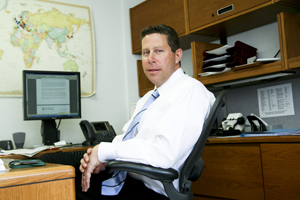David Nelson, M.D., has been named director of the Clinical and Translational Science Institute at the University of Florida.
Nelson, a professor of medicine and a leader in liver transplantation and hepatology at the UF College of Medicine, is engaged in multidisciplinary approaches to improve translational research and patient care. He has forged numerous collaborations with researchers across UF and the state, as well as with leaders in industry.
He brings to the new position a commitment to further the institute’s goals of speeding new treatments to patients, and producing a highly trained force of researchers and physicians.
“The goal is to make the current clinical and translational researchers here more productive and efficient in their efforts,” Nelson said. “We want to become the mechanism to integrate a very talented and diverse research community at the university.”
The institute’s success will in large measure be determined by its ability to attract additional research funding.
UF won a competitive Clinical and Translational Science Award last year from the National Institutes of Health. The $26 million award over five years will help lay a framework for accelerating the progress of translational research and medical advances at the university. With the award, UF joined a prestigious national consortium of medical research institutions working toward enhancing scientific discovery and medical care, producing highly skilled scientists and physicians and fostering partnerships with industry. The institute, a partnership of several colleges and entities within the university and in the wider community, also is supported by $23 million from the UF Office of Research and $70 million in commitments from the College of Medicine.
“I am pleased that Dr. Nelson is taking on this crucial leadership role,” said Dr. David Guzick, senior vice president for health affairs at the UF Health Science Center and president of the UF&Shands health system. “His vibrant basic science and clinical research program in hepatobiliary diseases and his active involvement in the CTSI as director of the Regulatory Knowledge and Key Functions Support Program position him for success. I have every confidence he and the CTSI team will effectively build on our achievements to date and take us to the next level.”
Nelson’s accomplished career in medicine includes earning a medical degree from SUNY Upstate University in Syracuse, N.Y. and completing residency in internal medicine at the University of Massachusetts and fellowship training in gastroenterology and hepatology at UF. He oversees more than 15 clinical trials and his NIH and industry-sponsored research grants top $8 million. Nelson has published more than 150 scholarly papers and is associate editor of the journal Hepatology.
Nelson, whose clinical expertise is in hepatology with an emphasis on the management of viral hepatitis and liver cancer, will continue to see patients and remain active in teaching and in mentoring and training gastr
ointestinal and liver program fellows.
He also will continue his research on hepatobiliary diseases. He has led development of initiatives such as a unique liver cancer clinic in which hepatologists play a key role in cancer management, delicately balancing treatment of cancer with that of underlying liver disease that can worsen as a result of cancer treatment.
The clinic also serves as a hub for translational research, where patients donate blood and tissue to be used in research in areas such as developing cancer markers and therapies that take advantage of patients’ own immune systems.
“Dr. Nelson has significant experience leading translational research within his own field and has been a major contributor to the development of the University of Florida’s CTSI,” said Win Phillips, UF’s vice president for research. “His leadership skills make him an excellent choice as director of the CTSI as it moves forward.”


